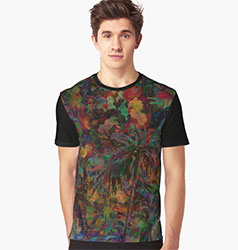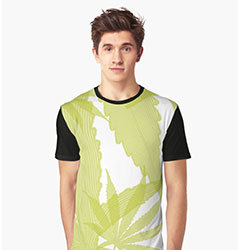
For I will consider my dog Percy.For he was made small but brave of heart.For if he met another dog he would kiss her in kindness.For when he slept he snored only a little ....For he ate only the finest food and drank only the purest of water, yet he would nibble of the dead fish also.For he came to me impaired and therefore certain of short life, yet thoroughly rejoiced in each day.For he took his medicines without argument.—Mary Oliver, “For I Will Consider My Dog Percy”
If you’ve ever truly loved a pet, you may be familiar with the pain of looking into a suffering animal’s eyes, trying to intuit what it needs to ease its discomfort. A growing number of veterinarians and pet owners now believe that, just as humans can benefit from medical cannabis, domestic dogs and cats can also be treated with the healing herb as an alternative to veterinary drugs.
As do all mammals, dogs and cats possess the cannabinoid receptors CB1 (which react to the psychoactive effects of cannabis) and CB2 (which react to its anti-inflammatory and pain-relieving effects). Spot and Fluffy clearly feel strange when they ingest marijuana: Just look up “My Dog [1][or My Cat[2]] Ate Weed” on YouTube.
According to A Guide to Plant Poisoning of Animals in North America, by Anthony Knight and Richard Walter, cattle, horses, pigs and dogs have been documented as intoxicated and in need of medical treatment after eating cannabis. The ASPCA Animal Poison Control Center[3]’s official position on pets and cannabis states: “At this point the ASPCA does not support using marijuana in pets for pain control. There have been no scientifically accepted studies comparing marijuana products to known pain control medications (opioids, nonsteroidal anti-inflammatory drugs). In addition, research has not been able to adequately define what a safe and effective dose of marijuana would be due to the wide variety in product available.”
The clinical effects of THC ingestion in pets can include depression, listlessness, loss of motor coordination and balance, vomiting, hypothermia, agitation, diarrhea, drooling, urinary incontinence, seizures and, in a very few reported cases, coma or death. That’s no fun for Fido—or for any responsible pet owner. So, just as you keep your edibles, dabs, hash and flowers away from kids, keep it off the coffee table so that Mr. Snix doesn’t scarf it down and get all woozy. (And check out our article on what to do if your pet does eat your stash[4].)
While THC can be severely toxic for animals, veterinarians and other animal caregivers have discovered that, like humans, some dogs and cats respond positively to cannabidiol (CBD), a non-psychoactive component of cannabis. Many pet owners are turning to low-THC, high-CBD tinctures or hemp-oil CBD treats as a holistic treatment for their furry comrades. CBD doesn’t get animals high, and evidence seems to show that it can provide them relief from pain, anxiety, seizures, arthritis, nausea and other ailments.
Concerned about the ethical implications of giving Spike weed, even if it’s just CBD for his stiff doggy knees? Consider the side effects of regular vet medications. Throughout his years running an animal clinic in California, veterinarian Tim Shu has observed the unwanted and sometimes harmful side effects in pets treated with standard drugs. “Medications for pain, arthritis, anxiety and seizures can cause pets to become sedated or lethargic,” he explains. “Some medications can even have side effects like kidney or liver damage.”
So Shu teamed up with Kate Scott, an experienced registered veterinary technician, to investigate the effects of medical marijuana in humans. They pored over years of research—much of it conducted on animal subjects—and then carefully concocted a CBD-rich tincture designed specifically for cats and dogs. “A lot of the research was done with lab animals and applied to people,” Shu says. “We’re bringing it back to the animals.”
The resulting product, VetCBD[5], is a tincture with a 19:1 CBD-to-THC ratio, sourced from organically grown cannabis. “We’ve never used hemp, and we never will, for a number of reasons,” Shu declares. “Mostly because of the entourage effect.” He’s referring to the interactive synergy that occurs within the entire complex of cannabinoids and terpenoids in whole-plant medicine extracted from the cannabis flower—an effect that is lost when CBD is isolated for use without THC or the accompanying terpenes.
Pet owners with a medical marijuana recommendation can buy VetCBD from dispensaries throughout California. Shu and Scott also offer a round-the-clock hotline: “Pet owners can call or email us anytime—that way, they have someone from the veterinary world by their side,” Shu says.
On the other side of the Rockies, in southwest Colorado, twin sisters Debbie Cokes and Kris Otto preside over RxCBD[6], an all-female-staffed company that manufactures CBD-infused hemp treats for dogs and cats, as well as body products and CBD cookies and crackers for humans. The siblings have “about 80-plus years’ combined experience in the cannabis industry,” Cokes proclaims. “Longer than others in the industry have been alive!”
After witnessing the benefits of CBD-rich medical marijuana administered to their ailing father in place of pharmaceuticals, Cokes and Otto researched the effects of CBD on pets. The duo subsequently created a line of high-CBD, gluten-free pet biscuits, made entirely with human-consumption-grade ingredients. (If you snack on one by accident, you just might enjoy it.) “We rely on very tight quality control and defensible data,” avows Cokes, a civil engineer and environmental scientist.
The pair ultimately chose to source the CBD for Benny’s Healthy Hemp Treats (for dogs) and Anna’s Healthy Hemp Treats (for cats) from hemp oil as opposed to cannabis flowers. Otto, a master baker whose background is in molecular, cellular and developmental biology, explains: “A CBD molecule is a CBD molecule is a CBD molecule. Sourcing it from hemp is the way that we’ve found to appease the regulators and offer a product suitable for pets.” That hemp-versus-cannabis distinction means that Healthy Hemp Treats are available to purchase and ship anywhere in the country, since THC constitutes less than 0.3 percent of the active ingredients in the treats, which are therefore not subject to state or federal laws governing medical marijuana products. And while high-CBD hemp-oil extracts don’t contain the same level of cannabinoids and terpenoids that cannabis-flower extracts do, they have their own whole-plant synergy, which has been dubbed the “hemptourage” effect.
Testimonials on the RxCBD website herald Healthy Hemp Treats as a life-changing therapy for anxious animals. One pet owner writes: “My cat is an uptight girl—hissing at strangers and sometimes at me. A CBD treat was like a ‘chill pill’ for her. Both of us are happier.”
RxCBD and VetCBD products recommend dosages based on the body weight of the patient. RxCBD biscuits are recommended in half-biscuit doses for small dogs, all the way up to five or seven biscuits a day for an 85- to120-pound dog. The olive-oil-based VetCBD tincture, which can be administered orally via syringe or added to a pet’s meal, has a suggested dose of 0.5 milliliters twice daily for a 10-pound animal, 1 ml twice daily for a 10-to-25-pound animal, and so on. Dosages can be increased or decreased safely depending on how the individual pet responds to the treatment.
Although he doesn’t necessarily recommend it, Shu says that pet owners are often able to wean their furry companions off traditionally prescribed medications once they’re being treating with VetCBD. The side effects of vet meds like Rimadyl and Metacam, which can cause vomiting, diarrhea, and liver or kidney problems, are no longer an issue. “We see direct evidence of the benefits of VetCBD,” Shu asserts. One happy dog owner’s testimonial on the VetCBD website proclaims: “Since starting VetCBD, my 10-year-old Shiba Inu, who suffers from severe arthritis, has increased range of motion, agility, and wants to play (chasing a tennis ball) again.” Another endorsement trumpets: “Thank you for saving my dog WuTang’s life!”
Both RxCBD and VetCBD hope to expand their business as cannabis legalization advances across the country. Shu looks forward to spreading the word about medical pot for pets: “We want to be wherever pet owners need us,” he says. “Medical marijuana is not only beneficial for people; it’s hugely beneficial for animals, too. We want to change the stigma and educate people about using medical marijuana for pets properly.”
Visit VetCBD.com[7] and RxCBD.co[8] for more information.
Read more http://feedproxy.google.com/~r/HIGHTIMESMagazine/~3/I7v-GT3RMe0/creature-comforts-pets-pot
Latest
Coronavirus Strikes Massachusetts Cannabis Company Employees
Reassessing the Essential: Cannabis in the Time of a Pandemic
5 Reasons To Try Aspen Valley CBG Flower (30% Off)
High Times Cannabis Cups Go Virtual In Wake Of Coronavirus Pandemic
Drug Enforcement Administration Proposes Plan To Expand Cannabis Research
Ghana Legalizes Cannabis For Medicinal And Industrial Uses
The cheapest legal weed in Canada: Discover these cannabis ‘value brands’
Cannabis and coronavirus: Here’s what you need to know
cannabis designs
The Best Of
WHO Rules CBD Should Not Be a Scheduled Drug

Dr Cristina Sanchez PhD video interview on medical marijuana and cancer

Biochemist Dennis Hill interview; Cannabis oil as a cure for cancer.

The unofficial World Record holder for cannabis smoking part 1





